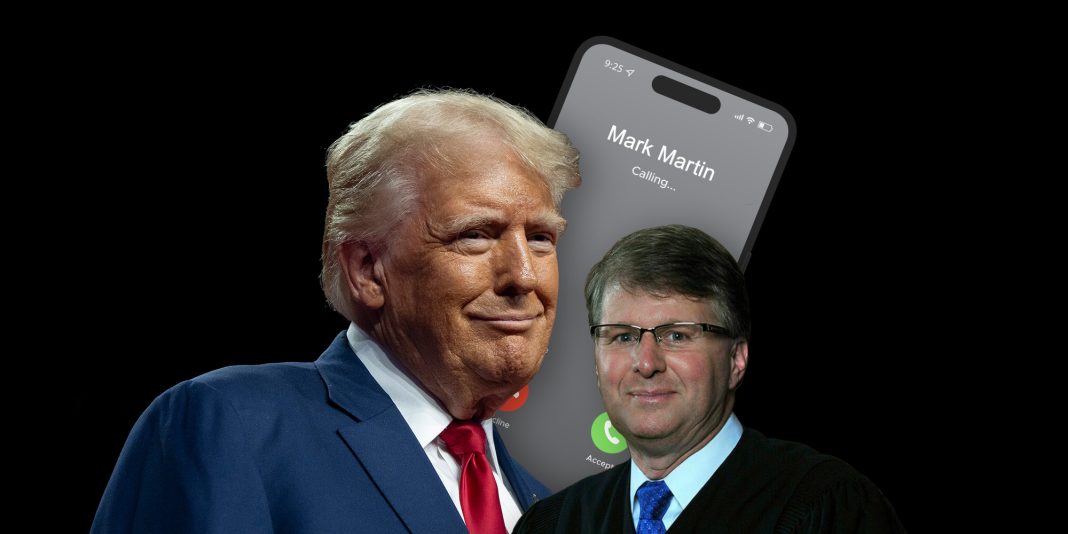In the intricate web of legal maneuvering surrounding the aftermath of the 2020 presidential election, one figure stands out for his connections to key players in former President Donald Trump’s efforts to overturn the election results: Mark Martin, the inaugural dean of the law school at High Point University in North Carolina. While Martin himself has not been indicted or publicly scrutinized for his actions, recent evidence filed by special counsel Jack Smith reveals a network of unindicted co-conspirators closely linked to him, raising questions about his involvement in these unprecedented attempts to challenge the electoral process.
The narrative begins with Martin’s direct communications with Trump in the wake of the election. Notably, on the evening of January 6, 2021, as chaos unfolded at the Capitol, Trump reached out to Martin for a nine-minute conversation. The contents of that discussion remain undisclosed, but it is significant that Martin was among a select group of legal advisors, which included prominent figures like Rudy Giuliani and Cleta Mitchell, who were deeply entrenched in Trump’s efforts to contest the election results. This connection underscores Martin’s proximity to the heart of the controversy, even as he has remained largely in the shadows.
Martin’s involvement appears to have been catalyzed by his relationship with Mark Meadows, Trump’s chief of staff, who is also identified in Smith’s brief. Testimonies from former White House attorney Eric Herschmann suggest that Martin was actively advising other attorneys supporting Trump’s campaign, indicating that he was part of a broader legal strategy that sought to exploit the political landscape for electoral gain. Herschmann’s remarks highlight the collaborative nature of these efforts, as he described a group of lawyers, including Martin, working together on various legal challenges.
One of the most notable cases associated with Martin is Texas v. Pennsylvania, which aimed to contest the election results in several states. Although Martin did not sign the briefs for this case, he played a pivotal role in recruiting Texas Attorney General Ken Paxton to file the challenge. This case was swiftly dismissed by the Supreme Court, which ruled that Texas lacked standing to challenge the election procedures of other states. Yet, the dismissal did not deter Martin’s involvement; rather, it marked the beginning of a series of legal strategies that would culminate in the infamous “fake electors” scheme.
In early December 2020, John Eastman, another key figure in the legal battle, circulated a memo outlining a strategy to undermine the election results. This memo, which Eastman described as “huge and hugely important,” laid the groundwork for the fraudulent electors plan that has since led to criminal charges against several individuals involved. While Eastman and others have faced significant legal repercussions, Martin’s name has not surfaced in the same way, raising questions about accountability among those who participated in these efforts.
The January 6 committee’s investigation further illuminates Martin’s connections, as he was mentioned in subpoenas issued to various witnesses, including figures like Mike Flynn and Peter Navarro. However, despite the committee’s inquiries, Martin has largely evaded public scrutiny, a fact that stands in stark contrast to the fates of his co-conspirators. This discrepancy is particularly striking in light of the Supreme Court’s recent ruling granting Trump broad immunity for actions taken in his official capacity, which has effectively shielded many of his allies from accountability.
As the evidence against Trump continues to unfold, it paints a troubling picture of the lengths to which a cadre of attorneys and campaign operatives went to maintain power. The lack of formal charges against Martin, despite his apparent involvement in these efforts, raises critical questions about the ethical responsibilities of legal professionals in the political arena. Experts in legal ethics argue that lawyers have a duty to uphold the rule of law, and those who engage in actions that undermine democratic processes should be held accountable.
In conclusion, while Mark Martin has not faced the same level of scrutiny as other figures in the Trump legal saga, the connections revealed in recent filings suggest a deeper involvement in efforts to overturn the 2020 election. As the legal landscape continues to evolve, the implications of these revelations may prompt further investigation into the roles played by those who operated behind the scenes, challenging the very foundations of democratic governance. The unfolding narrative serves as a reminder of the critical importance of accountability in the legal profession, particularly in times of political upheaval.


